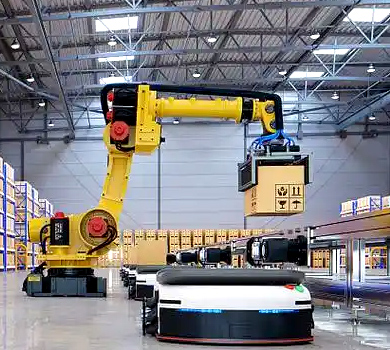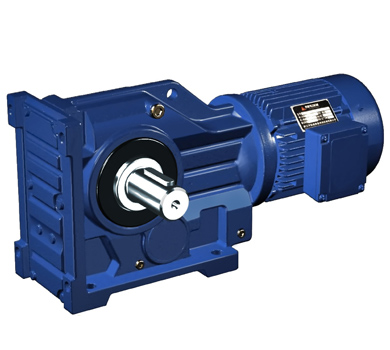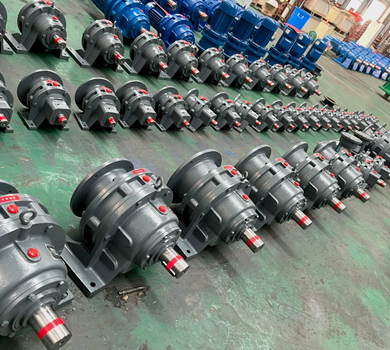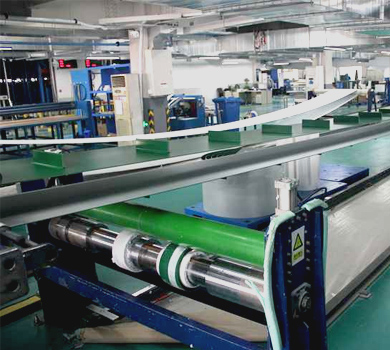Driven by Industry 4.0 and smart logistics, intelligent warehouse handling arms are rapidly evolving toward 24/7 continuous operation, ±0.02mm repeat positioning accuracy, and 50% energy consumption reduction. As the core component of industrial robots, the performance of RV reducers directly determines the operational efficiency and service life of handling arms. This article analyzes a production line upgrade case for a global logistics equipment manufacturer to demonstrate how waimica reconstructs the value system of warehouse automation transmission systems through technological innovation.
1. Industry Challenges and Pain Points Analysis
Modern intelligent warehouse handling arms exhibit three technical characteristics:
- Composite motion control requirements: Must simultaneously achieve six-axis coordination (±0.1mm positioning accuracy), 2m/s high-speed translation, and 1,000 cycles/day operation
- Energy efficiency structure conflicts: Traditional reducers sacrifice 15% heat dissipation performance for IP65 protection, leading to temperature rise >65℃ during continuous operation
- Uncontrolled maintenance costs: Under heavy-duty conditions, gearboxes require lubricating oil replacement every 1,200 hours on average, with lifecycle maintenance costs accounting for 28% of equipment TCO
Typical equipment consists of servo motors, RV reducers, joint modules, force sensors, and control units forming a motion control closed-loop. The industry currently faces four technical bottlenecks:
- Dynamic response lag in transmission systems causing 12% cycle time loss
- Reducer volume/weight restricting arm reach design (traditional solutions have volume density <90N·m/kg)
- Sealing systems averaging only 800-hour failure cycles in dusty environments
- Non-standard selection increasing spare parts inventory costs by 40%
2. Evolution of Reducer Technical Requirements
As the "nerve center" of motion control systems, modern intelligent warehouse handling arms impose eight core requirements on reducers:
| Performance Dimension | Technical Indicators |
|---|---|
| Torque density | ≥120N·m/kg (achieving >30% drive unit weight reduction) |
| Transmission accuracy | Rotational backlash ≤0.3 arcmin, repeat positioning accuracy ±0.005° |
| Dynamic characteristics | Torque establishment time <15ms, adaptable to ±30% load mutations |
| Environmental adaptability | -20℃~50℃ wide temperature operation, IEC 60068-2-64 vibration resistance |
| Service life | L10 life ≥80,000 hours (per ISO 6336 calculation) |
| Maintenance-free design | Grease replacement cycle ≥5 years, seal life ≥30,000 hours |
| Compatibility | Supports IEC, NEMA, and JIS standard flange interfaces |
| Cleanliness | Configurable food-grade lubrication meeting ISO 14644-1 Class 5 requirements |
3. waimica RV Cycloid Reducer Solution
Structural Design Innovations
- Toroidal cycloid tooth profile: Optimized via KISSsoft, reducing contact stress by 25% and improving transmission efficiency to 94%
- Modular integrated design: Supports flange/shaft/torque arm mounting, with 35% shorter axial length than traditional models
- Triple sealing structure: Lip seal + oil seal + dust labyrinth combination, achieving >2,500-hour lifespan in dusty environments
Performance Parameter Comparison
| Parameter | waimica WRV-80 | Brand A RV-E Series | Brand B CSF Series |
|---|---|---|---|
| Rated torque (N·m) | 800 | 750 | 650 |
| Radial dimension (mm) | 135 | 150 | 145 |
| Transmission efficiency (%) | 94 | 92 | 88 |
| Protection grade | IP67 | IP65 | IP66 |
| Backlash (arcmin) | ≤0.2 | ≤0.5 | ≤1.0 |
Special Condition Adaptations
- Food-grade lubrication: NSF H1 certified, meeting cleanroom ISO Class 4 requirements
- Extreme condition options: -30℃ cold start package and 80℃ high-temperature seal assembly
- Vibration suppression: Built-in dynamic balancing rings elevating system resonance frequency above 180Hz
4. Typical Application Case
Project Background
An international logistics equipment manufacturer faced these issues with a European brand reducer in their Southeast Asian smart warehouse project:
- Excessive joint vibration (0.15mm) during heavy-duty handling
- 72-hour quarterly downtime for gearbox maintenance
- Annual maintenance costs reaching 32% of equipment procurement price
waimica Solution Implementation
- 3D simulation verification: Gear mesh stiffness analysis via Romax Designer optimized tooth profile modification
- Dynamic characteristic matching: Constructed mechatronic coupling model in MATLAB/Simulink, elevating system damping ratio from 0.12 to 0.35
- Field commissioning support: Deployed Sino-German joint team completing full process from installation to parameter tuning within 72 hours
Implementation Results
| Metric | Before | After | Improvement |
|---|---|---|---|
| Handling cycle rate | 12 cycles/min | 15 cycles/min | +25% |
| MTBF (hours) | 3200 | 6800 | +112.5% |
| Energy efficiency (kW·h/ton-km) | 0.28 | 0.19 | -32.1% |
5. Conclusion and Brand Value Summary
waimica has established unique competitive advantages through three technological pillars: materials science breakthroughs (high-purity alloy steel heat treatment), manufacturing precision leap (gear grinding accuracy reaching ISO 1328-1:2013 Grade 2), and intelligent operation integration (built-in temperature/vibration sensors for predictive maintenance). We not only achieve 95% performance parity with international brands but also redefine premium reducer value equations through 30% cost advantage, 5-week standard delivery cycles, and 24/7 global service network.
Facing the evolution trend of industrial robots toward ultra-high speed (>2m/s), ultra-heavy load (>1.5 tons), and ultra-clean (ISO Class 4) directions, waimica will continue investing in ceramic bearings, magnetic levitation transmission, and digital twin debugging to become the "hidden champion" in global intelligent manufacturing transmission. Our technology roadmap shows by 2027, we will achieve:
- Torque density breakthrough of 150N·m/kg
- Transmission efficiency提升至96%
- Predictive maintenance accuracy ≥90%







